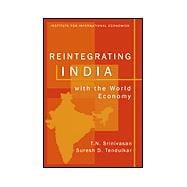In this study, Professors Srinivasan and Tendulkar analyze the economics and politics of India's recent and growing integration with the world economy. They argue that this process has to be nurtured and accelerated if India is to eradicate its poverty and take its rightful place in the global economic system. The topics covered include historical roots and the political economy of India's late integration; domestic and external constraints on integration; external capital inflows including foreign direct investment; and India's emerging comparative adva








